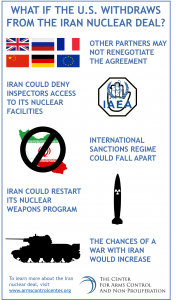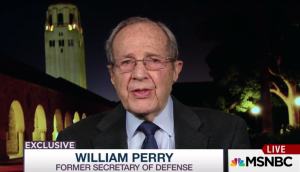What’s News:
One year later, the Iran nuclear deal is a success by any measure
January 16, marked a full year since the nuclear agreement between the U.S., its negotiating partners, and Iran, known as the Joint Comprehensive Plan of Action (JCPOA), was officially implemented. The agreement has been a certifiable success in its first year, achieving its objects of blocking Iran’s path to a nuclear weapon and increasing visibility into Iran’s nuclear activities. To read executive director, John Tierney’s op-ed in The Hill on the success of the deal and why it should be maintained by the new administration, click here.
President-elect Trump’s choice for Secretary of Defense, General Mattis, has in the past made statements critical of the U.S. nuclear weapons status quo. Read executive director John Tierney’s op-ed that outlines General Mattis’ questions about U.S. nuclear weapons policy and explains the general should use his influence to answer them himself in the new administration. To read the op-ed in US News, click here.
Read:
Trump, do we really need more nuclear weapons capabilities?
Council board member Aron Bernstein writes about the massive capabilities of U.S. nuclear submarines and the extent of devastation any one existing U.S. nuclear sub can cause. In the piece, he details Russia’s matching nuclear capabilities and Moscow’s worrying atrophying early warning system. Mr. Bernstein asks President-elect Trump to engage with President Putin to reduce nuclear arsenals in both countries, which would make the U.S., Russia and the world safer, instead of pursing a destabilizing new arms race. To read the op-ed in The Hill, click here.
Rex Tillerson on Nuclear Weapons Issues
Secretary of State-designate Rex Tillerson provided some of the first concrete indications of the Trump administration’s positions on nuclear weapons issues during his confirmation hearing. To read excerpts on his answers to nuclear weapons related questions on the Nukes of Hazard blog, click here.
Guess who we don’t talk about these days? Iran
The nuclear agreement with Iran no longer makes headlines. The U.S. doesn’t face an imminent Iranian nuclear threat; that’s because the core of the Iran nuclear agreement which caps and reduces Iran’s nuclear activities has been a success. Click here to read board member, Dr. Jim Walsh’s co-authored op-ed in The Charlotte Observer to learn why Iran’s nuclear program is one less worry in 2017.
Understanding the New START Agreement
The New Strategic Arms Reduction Treaty (New START) between the United States and Russia places central limits on strategic nuclear arsenals on both signatories. To learn about the background, importance and verification measures of New START, read the Center’s factsheet here.
Infographic: What If the U.S. Withdraws from the Iran Nuclear Deal?
President-elect Trump has repeatedly attacked the Iran nuclear agreement, referring to it as a disaster and at one point promising on the campaign trail to tear it up. But what would happen if the U.S. were to withdraw from the agreement? Look at the Center infographic below and click here for a printable version.
Watch:
Former Secretary of Defense William Perry talks about nuclear dangers on MSNBC
Former Secretary of Defense, William Perry believes that today the likelihood of a nuclear catastrophe is greater than it was during the Cold War. He suggests that the nuclear dangers from the Cold War are returning with the increasing hostility between the U.S. and Russia — and two new dangers, nuclear terrorism and regional nuclear war, exist today like never before. To learn more, watch William Perry’s interview on MSNBC here.


